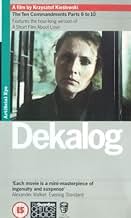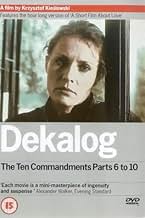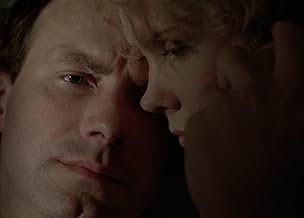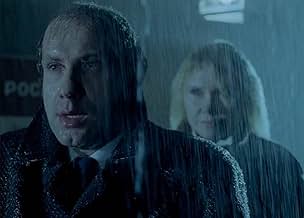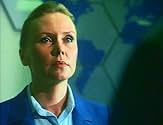Dekalog, dziewiec
- Episode aired Jun 29, 1990
- TV-MA
- 1h
IMDb RATING
8.0/10
3.8K
YOUR RATING
Following the discovery of his sexual impotence a man urges his wife to take a lover.Following the discovery of his sexual impotence a man urges his wife to take a lover.Following the discovery of his sexual impotence a man urges his wife to take a lover.
- Director
- Writers
- Stars
- Director
- Writers
- All cast & crew
- Production, box office & more at IMDbPro
Featured reviews
'Dekalog' is a towering achievement and a televisual masterpiece that puts many feature films to shame, also pulling off a concept of great ambition brilliantly. Although a big admirer of Krzysztof Kieślowski (a gifted director taken from us too early), and who has yet to be disappointed by him, to me 'Dekalog' and 'Three Colours: Red' sees him at his best.
All of 'Dekalog's' episodes have so many great things, and it is an example of none of the lesser episodes (my least favourite being the still very good Episode 8) being bad. This is testament to the high quality of 'Dekalog' as an overall whole and how brilliant the best episodes are.
Episode 9 is yet another great one from 'Dekalog'. The story is one of the slighter ones of the series, but that is by no means a flaw. My only complaint is the middle act dragging a little bit, otherwise Episode 9 is great stuff while falling short of being one of the best 'Dekalog' stories like Episodes 1, 4, 5 and 6.
As per usual, it is exceptionally well made. The production values in Episode 9 are as ever atmosphere-enhancing, beautiful and haunting to look at and fascinating, definitely cannot be faulted on the technical front. The direction is quietly unobtrusive, intelligently paced and never too heavy, and the music is suitably intricate.
Characters are interesting, well-developed and feel like real people in a compelling sense. The story is thematically rich with much to say about its central conflict of sexuality and love. They are explored intelligently without descending into heavy-handedness, and the episode is powerfully moving, thought-provoking and life-affirming. The acting is superb as to be expected, with complexity and nuances by the bucket-load.
All in all, great 'Dekalog' episode but not one of the series' finest. 9/10 Bethany Cox
All of 'Dekalog's' episodes have so many great things, and it is an example of none of the lesser episodes (my least favourite being the still very good Episode 8) being bad. This is testament to the high quality of 'Dekalog' as an overall whole and how brilliant the best episodes are.
Episode 9 is yet another great one from 'Dekalog'. The story is one of the slighter ones of the series, but that is by no means a flaw. My only complaint is the middle act dragging a little bit, otherwise Episode 9 is great stuff while falling short of being one of the best 'Dekalog' stories like Episodes 1, 4, 5 and 6.
As per usual, it is exceptionally well made. The production values in Episode 9 are as ever atmosphere-enhancing, beautiful and haunting to look at and fascinating, definitely cannot be faulted on the technical front. The direction is quietly unobtrusive, intelligently paced and never too heavy, and the music is suitably intricate.
Characters are interesting, well-developed and feel like real people in a compelling sense. The story is thematically rich with much to say about its central conflict of sexuality and love. They are explored intelligently without descending into heavy-handedness, and the episode is powerfully moving, thought-provoking and life-affirming. The acting is superb as to be expected, with complexity and nuances by the bucket-load.
All in all, great 'Dekalog' episode but not one of the series' finest. 9/10 Bethany Cox
A knowledgeable film enthusiast will surely know the way in which infidelity is treated by some of the biggest names in European cinema. For a good example there is French Hitchcock Claude Chabrol whose films take pleasure in showing husbands brutally killing the lovers of their wives when they come to know of their wives' foolish infidelities.There is also Krzysztof Kieslowski,a Polish cinéaste who presents an East European vision of modern Polish society dealing with males and females cheating their respective partners."Dekalog: Dekalog,Dziewiec (#1.9)" turns out to be an outstanding infidelity film as it makes an honest attempt to link marital infidelity with confidence,trust and love which is needed by all couples in order to nurture and sustain their married lives.In this medium length feature Kieslowski asks a challenging question :can a bourgeois couple have reason to cheat each other if they have everything which they could wish for ? It is for the viewers to search for an answer which suits their intellectual level keeping in mind that nothing worthwhile can be said about a couple which is dishonest in spite of having no dearth of emotional richness.
I'm a bit upset at our filmmaker.
I know that each of these ten is its own little experiment. Each has its own adventure in vision and dreaming. But all ten have an arc as well. Oh, not in the stories; they're good enough in their way. What I mean is the cadence that comes from the difference in how each of these sees.
Some have an eager eye, others lazy. Sometimes the eye is inside the emotional container of the thing. Sometimes, often, the camera is liquid on some surface that is emotionally tipped. They're all different, and together we have a sort of poem in how the rocks are arranged in the sky for us to see as art after we have seen the immediate art by standing on each of them.
So we are nearing the end, and this penultimate eye is essential to giving us distance.
Sure enough, almost everything about this is perfect. Its about spying, about placing yourself to see hoping to not get hit by what we see and knowing we will.
There's lots of architectural framing, interstitial platforms and invaginations. Its about children lost before they were had, the greatest tragedy.
So why am I miffed, if it is so perfect, so delicately jolting? Because in the final scene he leaves his Kieslowski world and gives us a shot so banal, so ordinary, so conventionally shot we wonder what he was thinking. Its a phone call, alternating between the husband calling and the wife receiving.
Its a Hitchcock-derived shot. Now don't get me wrong, Hitchcock invented the curious, floating camera that Kieslowski (and Chris Doyle) exploit. But his setups are so quoted now that to use one today is almost a matter of parody. And that's what we are left with.
I can only assume that the difference was intended, that our filmmaker wanted to let us know that things will be different now. That it will now be "real" and not a man and woman acting real and watching themselves work at it.
But it is shocking, that call.
Ted's Evaluation -- 3 of 3: Worth watching.
I know that each of these ten is its own little experiment. Each has its own adventure in vision and dreaming. But all ten have an arc as well. Oh, not in the stories; they're good enough in their way. What I mean is the cadence that comes from the difference in how each of these sees.
Some have an eager eye, others lazy. Sometimes the eye is inside the emotional container of the thing. Sometimes, often, the camera is liquid on some surface that is emotionally tipped. They're all different, and together we have a sort of poem in how the rocks are arranged in the sky for us to see as art after we have seen the immediate art by standing on each of them.
So we are nearing the end, and this penultimate eye is essential to giving us distance.
Sure enough, almost everything about this is perfect. Its about spying, about placing yourself to see hoping to not get hit by what we see and knowing we will.
There's lots of architectural framing, interstitial platforms and invaginations. Its about children lost before they were had, the greatest tragedy.
So why am I miffed, if it is so perfect, so delicately jolting? Because in the final scene he leaves his Kieslowski world and gives us a shot so banal, so ordinary, so conventionally shot we wonder what he was thinking. Its a phone call, alternating between the husband calling and the wife receiving.
Its a Hitchcock-derived shot. Now don't get me wrong, Hitchcock invented the curious, floating camera that Kieslowski (and Chris Doyle) exploit. But his setups are so quoted now that to use one today is almost a matter of parody. And that's what we are left with.
I can only assume that the difference was intended, that our filmmaker wanted to let us know that things will be different now. That it will now be "real" and not a man and woman acting real and watching themselves work at it.
But it is shocking, that call.
Ted's Evaluation -- 3 of 3: Worth watching.
Decalogue 9 - "Thou shalt not covet thy neighbor's wife" is a story of the words misinterpreted, the important phone calls missed by a second. The loving couple has to deal with the serious problems that include the husband's impotence and the wife's infidelity. She loves her husband and does not want to leave him even after she learns the sad truth about his condition. She wants to end a strictly physical affair with a younger boyfriend. Her husband does not know that and the tragedy of errors just about to happen
Decalogue 9 is also interesting because in it we first meet the main character of Kieslowski's later film, "Double Life of Veronique." Roman, the hero of Decalogue 9 is a heart surgeon and works in the hospital. One of his patients is a young, full of life girl who loves to sing and has a heart condition. Her favorite composers are Bach, Mozart, and Van den Budenmayer (a fictitious Dutch composer whose music is written by the regular Kieslowski's associate, Zbigniew Preisner).
9/10
Decalogue 9 is also interesting because in it we first meet the main character of Kieslowski's later film, "Double Life of Veronique." Roman, the hero of Decalogue 9 is a heart surgeon and works in the hospital. One of his patients is a young, full of life girl who loves to sing and has a heart condition. Her favorite composers are Bach, Mozart, and Van den Budenmayer (a fictitious Dutch composer whose music is written by the regular Kieslowski's associate, Zbigniew Preisner).
9/10
Eventually, this episode from the DEKALOG series will take on a life of its own. Beginning with a melodramatic premise-- a successful young doctor afflicted with irremediable impotence instructs his loving wife to take a lover-- Kieslowski constructs a 50 minute drama of extraordinary impact, the end of which is an affirmation of their marriage as a spiritual state these partners only half-perceive themselves. I called the film tragic above, but its arc parallels Shakespeare's late romance, THE WINTER'S TALE, right down to a near-miraculous conclusion. A lovely piece of work.
Did you know
- TriviaKieslowski and co-screenwriter Krzysztof Piesiewicz expressed an affection for the character of the young singer who contemplates surgery, and they lamented the fact that there was little for her to do in this story. When they began writing "The Double Life of Veronique", they remembered the plight of the singer in Dekalog - how her passion was limited by her sickness - and transferred this storyline over to the characters of Veronique and Weronika.
- ConnectionsReferenced in Three Colors: Red (1994)
Details
Contribute to this page
Suggest an edit or add missing content

